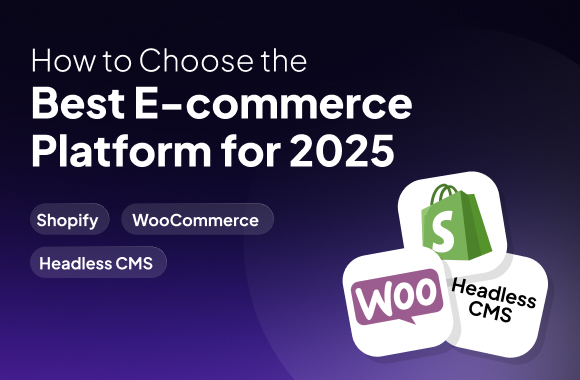In today’s digital-first world, launching an online store is easier than ever. But behind every successful e-commerce website lies a powerful platform that handles everything from product management to secure checkout. Whether you’re a startup or an established business, choosing the right e-commerce platform development strategy can make or break your online growth.
At Noseberry, we often get asked: “Should I choose Shopify, WooCommerce, or go headless for my e-commerce website development?” Let’s break down each option to help you make an informed choice.
Shopify: The Plug-and-Play Powerhouse
Best for: Businesses looking for simplicity, speed, and all-in-one solutions.
Shopify is a hosted e-commerce platform that lets you set up your store without worrying about hosting, security, or complex integrations. It’s ideal for entrepreneurs and brands who want to launch quickly and scale smoothly.
Pros:
- User-friendly dashboard with drag-and-drop functionality
- Robust app store for extended features
- 24/7 customer support
- Fast, secure, and reliable hosting
Cons:
- Monthly subscription fees can add up
- Limited flexibility for advanced customizations
- Transaction fees unless you use Shopify Payments
For many, Shopify is the go-to for efficient e-commerce website development without needing a full development team.
WooCommerce: The WordPress Wonder
Best for: Brands that want full control and already use WordPress.
WooCommerce is a WordPress plugin that transforms your site into a flexible online store. It’s open-source, meaning you get total customization over the look, feel, and functionality of your store.
Pros:
- Free to start (you only pay for hosting and optional plugins)
- Extensive customization with themes and extensions
- Large community and support ecosystem
- SEO-friendly architecture thanks to WordPress
Cons:
- Requires ongoing maintenance and updates
- Needs some technical knowledge to optimize performance
- Can become bloated with too many plugins
If you’re already familiar with WordPress, WooCommerce gives you the tools to tailor your store with precision—perfect for custom e-commerce platform development projects.
Headless CMS: Future-Proof and Flexible
Best for: Businesses focused on performance, omnichannel selling, and scalability.
A headless e-commerce development approach decouples the front-end from the back-end. This means you can use any CMS (like Contentful or Strapi) and connect it with any e-commerce backend (like BigCommerce, Shopify, or custom APIs). It’s a favorite for brands needing high flexibility, faster websites, and custom experiences across devices.
Pros:
- Lightning-fast performance with modern front-end frameworks (React, Next.js, etc.)
- Fully customizable UI and UX
- Seamless integrations with third-party services
- Ideal for omnichannel strategies
Cons:
- Requires a skilled development team
- Higher initial investment
- More complex to maintain than traditional platforms
Headless commerce is the bleeding edge of e-commerce website development. If performance, personalization, and scalability are your top priorities, this is the direction to explore.
So, Which One Should You Choose?
Choosing the right e-commerce platform depends on your goals, resources, and growth plans:
| Business Type | Best Option |
|---|---|
| Small/startup | Shopify |
| Content-heavy store | WooCommerce |
| Enterprise or custom | Headless CMS |
At Noseberry, we help businesses identify the perfect solution for their unique needs—whether a quick-launch Shopify setup, a fully customized WooCommerce store, or a cutting-edge headless e-commerce development build.
Final Thoughts
There’s no one-size-fits-all when it comes to building an online store. Shopify simplifies. WooCommerce empowers. Headless innovates. Choose the one that aligns with your business vision, technical capabilities, and long-term growth strategy.
Need expert guidance on e-commerce platform development? Get in touch with Noseberry today and let’s build your e-commerce success story together.


 Our Services
Our Services



